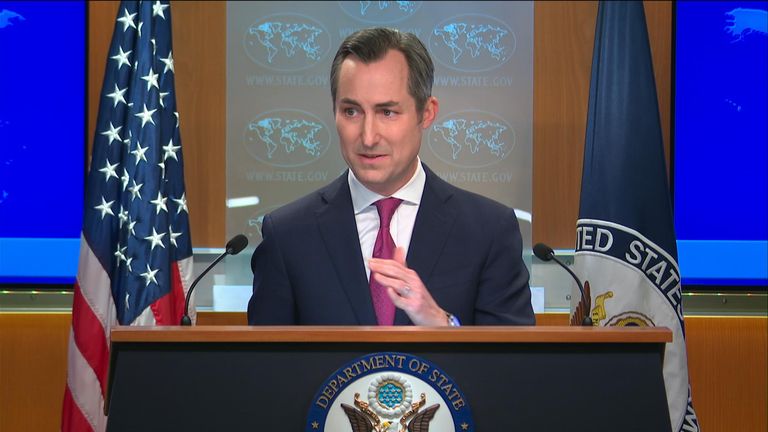PTBP Web Desk
The United States has imposed sanctions on Pakistan’s ballistic missile program, highlighting ongoing concerns about proliferation activities.
This move underscores the US’s stance on international nonproliferation and its commitment to acting against networks that support proliferation activities. The decision comes despite Pakistan’s long-term partnership with the US, signaling that the United States is willing to take firm action even against allies when its national security interests are at stake.
US State Department spokesperson Matthew Miller addressed the issue in a recent press briefing, stating, “The United States is committed to strengthening the international nonproliferation regime by taking action against networks supporting activities of proliferation concern.” He emphasized that the US has been clear about its concerns with Pakistan’s ballistic missile program for many years. These comments followed reports on September 13 that the US had imposed sanctions on a Chinese research institute and several companies for their involvement in supplying materials to Pakistan’s ballistic missile program.
Miller highlighted that the Beijing Research Institute of Automation for Machine Building Industry had worked with Pakistan to procure equipment for testing rocket motors for the Shaheen-3 and Ababeel missile systems. “As actions demonstrate, the United States will continue to act against proliferation and associated procurement activities of concern, wherever they occur,” he stated, emphasizing the US’s dedication to countering proliferation threats globally.
The sanctions imposed by the US are a clear indication of its commitment to nonproliferation. Miller noted that this action shows the existence of ongoing disagreements between the US and Pakistan. “When we have disagreements, we won’t hesitate to act on those to protect America’s interests,” he said. The US has a longstanding policy to deny support to Pakistan’s long-range ballistic missile program, aiming to prevent any impact on national security and to ensure that proliferators cannot use the US financial system.
The US’s decision to impose these sanctions is a reminder of the complex nature of international relations and the challenges that arise when strategic interests and nonproliferation goals intersect. While Pakistan has been a long-term partner of the US, this development signals the lengths to which the US is willing to go to uphold its nonproliferation commitments.
Following the US’s decision, Pakistan’s Foreign Office (FO) expressed its disapproval, labeling the move as “biased and politically motivated.” FO spokesperson Mumtaz Zahra Baloch criticized the decision, saying it undermines the credibility of global nonproliferation regimes due to its double standards and discriminatory practices. Baloch further noted that similar listings of commercial entities in the past were often based on suspicion rather than concrete evidence, with involved items not listed under any export control regime but considered sensitive under broad provisions.
This stance from the FO suggests that Pakistan views the US’s actions as part of a broader pattern of unfair treatment. The assertion of “double standards” implies that Pakistan perceives an inconsistency in how nonproliferation concerns are addressed by global powers, depending on their strategic interests.
The sanctions add another layer of complexity to US-Pakistan relations, which have experienced tensions over various issues, including Pakistan’s pursuit of a gas deal with Iran. The US has previously warned Islamabad against this deal, which has been on hold for several years. The imposition of sanctions on Pakistan’s ballistic missile program further highlights the delicate balance between maintaining a strategic partnership and addressing security concerns.
This situation also underscores the US’s broader nonproliferation strategy. By targeting entities involved in the development and procurement of missile technologies, the US aims to send a clear message about its commitment to preventing the spread of weapons of mass destruction and their delivery systems. This action against Pakistan’s missile program indicates that the US is not only concerned with nuclear nonproliferation but also with the means of delivering such weapons.
The US’s imposition of sanctions on Pakistan’s ballistic missile program may have several implications for international relations and global nonproliferation efforts. It reflects a firm stance on addressing proliferation activities and sends a message to other countries about the potential consequences of engaging in or supporting such programs. The US’s approach suggests that it will continue to use sanctions and other tools to counteract proliferation, regardless of the countries involved.
For Pakistan, these developments highlight the challenges of navigating international scrutiny over its missile program while maintaining strategic partnerships. The country may need to engage in diplomatic efforts to address these concerns and prevent further escalation of tensions with the US.




